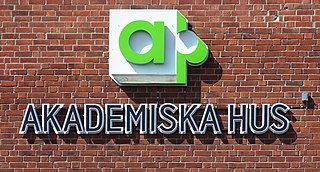
Telia Company AB is a Swedish multinational telecommunications company and mobile network operator present in Sweden, Finland, Norway, Estonia, Latvia and Lithuania.
A tax is a mandatory financial charge or some other type of levy imposed on a taxpayer by a governmental organization to collectively fund government spending, public expenditures, or as a way to regulate and reduce negative externalities. Tax compliance refers to policy actions and individual behaviour aimed at ensuring that taxpayers are paying the right amount of tax at the right time and securing the correct tax allowances and tax relief. The first known taxation took place in Ancient Egypt around 3000–2800 BC. Taxes consist of direct or indirect taxes and may be paid in money or as its labor equivalent.
Business is the practice of making one's living or making money by producing or buying and selling products. It is also "any activity or enterprise entered into for profit."

A capital market is a financial market in which long-term debt or equity-backed securities are bought and sold, in contrast to a money market where short-term debt is bought and sold. Capital markets channel the wealth of savers to those who can put it to long-term productive use, such as companies or governments making long-term investments. Financial regulators like Securities and Exchange Board of India (SEBI), Bank of England (BoE) and the U.S. Securities and Exchange Commission (SEC) oversee capital markets to protect investors against fraud, among other duties.

A security is a tradable financial asset. The term commonly refers to any form of financial instrument, but its legal definition varies by jurisdiction. In some countries and languages people commonly use the term "security" to refer to any form of financial instrument, even though the underlying legal and regulatory regime may not have such a broad definition. In some jurisdictions the term specifically excludes financial instruments other than equity and fixed income instruments. In some jurisdictions it includes some instruments that are close to equities and fixed income, e.g., equity warrants.

In accounting, revenue is the total amount of income generated by the sale of goods and services related to the primary operations of the business. Commercial revenue may also be referred to as sales or as turnover. Some companies receive revenue from interest, royalties, or other fees. "Revenue" may refer to income in general, or it may refer to the amount, in a monetary unit, earned during a period of time, as in "Last year, company X had revenue of $42 million". Profits or net income generally imply total revenue minus total expenses in a given period. In accounting, revenue is a subsection of the equity section of the balance statement, since it increases equity. It is often referred to as the "top line" due to its position at the very top of the income statement. This is to be contrasted with the "bottom line" which denotes net income.

Public finance is the study of the role of the government in the economy. It is the branch of economics that assesses the government revenue and government expenditure of the public authorities and the adjustment of one or the other to achieve desirable effects and avoid undesirable ones. The purview of public finance is considered to be threefold, consisting of governmental effects on:
- The efficient allocation of available resources;
- The distribution of income among citizens; and
- The stability of the economy.

Systembolaget, colloquially known as systemet or bolaget, is a government-owned chain of liquor stores in Sweden. It is the only retail store allowed to sell alcoholic beverages that contain more than 3.5% alcohol by volume. Systembolaget acts as a portal for private companies selling alcohol on the Swedish market and as of 2023, it represents 1,200 vendors ranging from small local breweries to large scale importers and multinational companies, selling products from a total of over 5,000 producers from all over the world.
An escort agency is a company that provides escorts for clients, usually for sexual services. The agency typically arranges a meeting between one of its escorts and the client at the customer's house or hotel room (outcall), or at the escort's residence (incall). Some agencies also provide escorts for longer durations, who may stay with the client or travel along on a holiday or business trip. While the escort agency is paid a fee for this booking and dispatch service, the customer must negotiate any additional fees or arrangements directly with the escort for any other services that are not provided by the agency involved, such as providing sexual services.
Funding is the act of providing resources to finance a need, program, or project. While this is usually in the form of money, it can also take the form of effort or time from an organization or company. Generally, this word is used when a firm uses its internal reserves to satisfy its necessity for cash, while the term financing is used when the firm acquires capital from external sources.
In macroeconomics and international finance, the capital account, also known as the capital and financial account, records the net flow of investment into an economy. It is one of the two primary components of the balance of payments, the other being the current account. Whereas the current account reflects a nation's net income, the capital account reflects net change in ownership of national assets.
A privately held company is a company whose shares and related rights or obligations are not offered for public subscription or publicly negotiated in their respective listed markets. Instead, the company's stock is offered, owned, traded or exchanged privately, also known as "over-the-counter". Related terms are unlisted company, unquoted company and private equity.
Modern monetary theory or modern money theory (MMT) is a heterodox macroeconomic theory that describes currency as a public monopoly and unemployment as evidence that a currency monopolist is overly restricting the supply of the financial assets needed to pay taxes and satisfy savings desires. According to MMT, governments do not need to worry about accumulating debt since they can pay interest by printing money. MMT argues that the primary risk once the economy reaches full employment is inflation, which acts as the only constraint on spending. MMT also argues that inflation can be controlled by increasing taxes on everyone, to reduce the spending capacity of the private sector.

Alcoholic drinks in Sweden are as common as in most of the Western world. Sweden is historically part of the vodka belt, with high consumption of distilled drinks and binge drinking, but during the later half of the 20th century, habits became more harmonized with western Europe, with increasing popularity of wine and weekday drinking. Wine is now also grown and produced in several parts of Sweden and the southernmost region of Skåne is turning into a hub experiencing a strong growth in number of active vineyards.
Unreported employment, also known as money under the table, working under the table, off the books, cash-in-the-claw, money-in-the-paw, or illicit work is illegal employment that is not reported to the government. The employer or the employee often does so for tax evasion or avoiding and violating other laws such as obtaining unemployment benefits while being employed. The working contract is made without social security costs and does typically not provide health insurance, paid parental leave, paid vacation or pension funds. It is a part of what has been called the underground economy, shadow economy, black market or the non-observed economy.

A black market, underground economy, or shadow economy is a clandestine market or series of transactions that has some aspect of illegality or is not compliant with an institutional set of rules. If the rule defines the set of goods and services whose production and distribution is prohibited or restricted by law, non-compliance with the rule constitutes a black-market trade since the transaction itself is illegal. Such transactions include the illegal drug trade, prostitution, illegal currency transactions, and human trafficking.

The economy of Sweden is a highly developed export-oriented economy, aided by timber, hydropower, and iron ore. These constitute the resource base of an economy oriented toward foreign trade. The main industries include motor vehicles, telecommunications, pharmaceuticals, industrial machines, precision equipment, chemical goods, home goods and appliances, forestry, iron, and steel. Traditionally, Sweden relied on a modern agricultural economy that employed over half the domestic workforce. Today Sweden further develops engineering, mine, steel, and pulp industries, which are competitive internationally, as evidenced by companies such as Ericsson, ASEA/ABB, SKF, Alfa Laval, AGA, and Dyno Nobel.

The National Property Board of Sweden is a Swedish State administrative authority, organised under the Ministry of Finance.

Akademiska Hus is a wholly owned Swedish Government enterprise with the mission to own, develop and manage property with a focus on educational and research activities — like colleges and universities — and to conduct related business. Its operations are carried out on a businesslike manner, with market rents, to generate a return. The company should also promote sustainable long-term development, according to instruction by the Government.

Beginning in 1995, Boris Yeltsin's government began privatizing state-owned shares in companies through a loans for shares scheme. The scheme helped with "fundraising" for Yeltsin's 1996 reelection campaign and restructuring freshly-sold companies at the same time.











